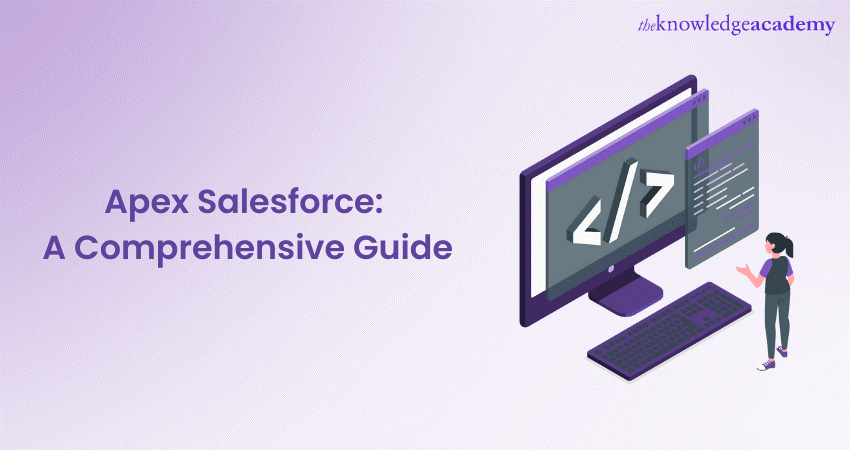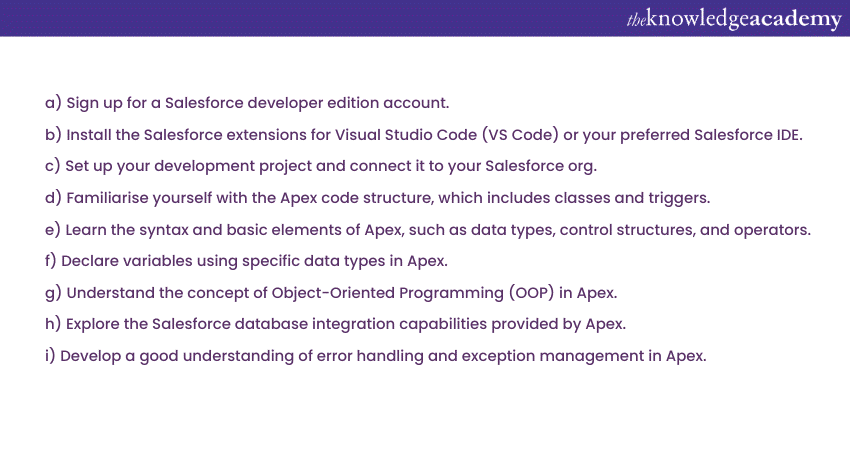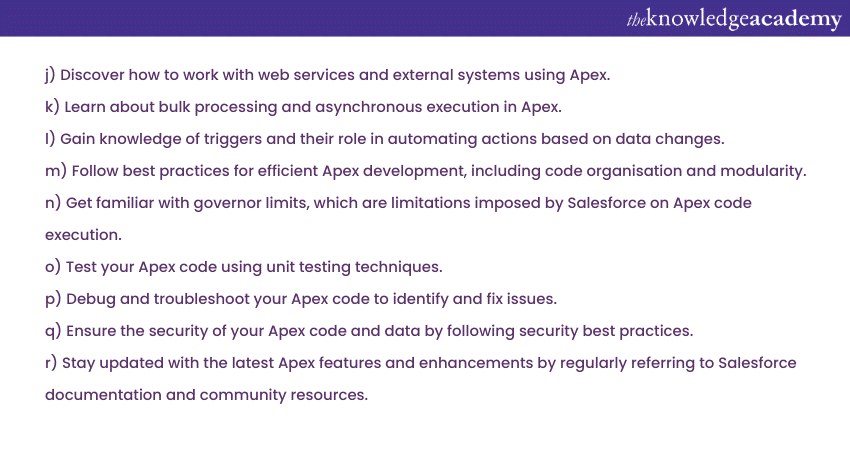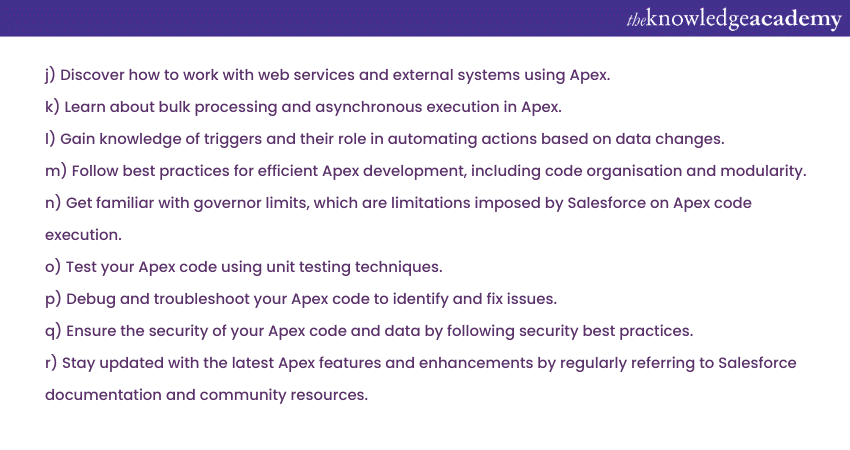We may not have the course you’re looking for. If you enquire or give us a call on 800969236 and speak to our training experts, we may still be able to help with your training requirements.
Training Outcomes Within Your Budget!
We ensure quality, budget-alignment, and timely delivery by our expert instructors.

Digitalisation has led to an increase in focus on efficient and effective Customer Relationship Management (CRM). One of the leaders in this steadily growing market is the Salesforce platform. Apex Salesforce is a language developed by the platform that has allowed developers to extend its capabilities and meet unique business requirements.
This blog will comprehensively explore the various aspects of Apex Salesforce, from its syntax and features to its integration capabilities and best practices.
Table of Contents
1) What is Apex Salesforce?
2) Getting started with Apex Salesforce
3) Features of Apex Salesforce
4) Apex Salesforce best practices
5) Conclusion
What is Apex Salesforce?
Before understanding what Apex Salesforce is, it is essential to understand what the Apex language is. Apex is a proprietary programming language developed by Salesforce for building applications on the Force.com platform. It is similar to Java and C#, making it easy for developers with a background in these languages to learn and work with Apex.
On that note, Apex Salesforce is a strongly typed, Object-Oriented Programming (OOP) language that runs on the Force.com platform. It provides developers with several features and tools to build scalable and secure applications within the Salesforce ecosystem. With Apex, developers can perform complex business logic, manipulate data, and interact with external systems.
Master the Salesforce Apex programming language and excel in CRM development with Salesforce Apex Programming Language Training. Register now!
Getting started with Apex Salesforce
This section will cover the essential steps to get started with Apex Salesforce development. Here's a detailed guide:
Learn the core concepts and roles of a Salesforce administrator, by signing up for the Salesforce Admin Course now!



Features of Apex Salesforce
Apex Salesforce offers a wide range of powerful features, making it a preferred choice for developing custom applications on the Salesforce platform. These features enhance the development experience and enable developers to build robust and scalable solutions. Let's explore some of the key features of Apex:
a) OOP capabilities: Apex supports OOP principles such as encapsulation, inheritance, and polymorphism. This allows developers to organise their code into reusable and modular components, making development more efficient and code maintenance easier.
b) Integration with the Salesforce database: Apex seamlessly integrates with the Salesforce database, allowing developers to perform database operations like querying, inserting, updating, and deleting records. This tight integration enables developers to build applications that effectively leverage and manipulate Salesforce data.
c) Robust error handling and exception management: Apex provides robust error handling and exception management mechanisms. Developers can catch and handle exceptions, ensuring the graceful handling of errors and preventing system crashes. This feature enhances the reliability and stability of Apex applications.
d) Support for web services and external integrations: With Apex, developers can integrate Salesforce with external systems and web services. This enables seamless communication between Salesforce and other applications, allowing data exchange and process automation across different platforms.
e) Bulk processing and asynchronous execution: Apex supports bulk processing, allowing developers to process large volumes of data in batches efficiently. Additionally, developers can execute asynchronous operations, enabling long-running processes without blocking the user interface or affecting performance.
f) Triggers for automating actions: Triggers in Apex are special code blocks that execute before or after specific database operations, such as record insertion, update, or deletion. They provide a powerful way to automate actions based on data changes, enabling developers to implement complex business logic and enforce data integrity.
g) Extensive testing and debugging capabilities: Apex provides robust testing and debugging capabilities. Developers can write unit tests to ensure the quality and correctness of their code. Additionally, Apex offers debugging tools and logs to help diagnose and fix issues during the development process.
h) Enhanced security and access control: Apex Salesforce incorporates strong security measures to protect data and ensure secure access. Developers can implement security best practices, enforce data access controls, and safeguard sensitive information, providing a secure environment for applications built on the Salesforce platform.
i) Seamless integration with Salesforce Lightning Components: Apex seamlessly integrates with Salesforce Lightning Components, allowing developers to create dynamic and interactive user interfaces. Apex controllers for Lightning Components enable server-side processing and business logic implementation, enhancing the overall user experience.
j) Extensive development resources and community support: Salesforce provides extensive documentation, trailheads, and a vibrant community of developers, making it easy to learn and master Apex. Developers can access a wealth of resources, tutorials, and forums to support their development journey.
Enhance user experience, and become a Salesforce Lightning expert with our comprehensive Salesforce Lightning Masterclass. Sign up today!
Apex Salesforce best practices
Following best practices ensures efficient, maintainable, and scalable code when developing applications using Apex Salesforce. Here are some essential best practices to keep in mind:
1) Code organisation and modularity
a) Organise your code into reusable and modular components, such as classes and methods, to promote reusability and maintainability.
b) Follow naming conventions and use descriptive names for variables, classes, and methods to enhance code readability.
c) Use comments to provide clear explanations and document your code for future reference.
2) Error handling and exception management
a) Implement proper error handling and exception management techniques to handle errors and prevent system crashes gracefully.
b) Use try-catch blocks to catch and handle exceptions appropriately, ensuring a robust error-handling mechanism.
c) Log exceptions and error messages to aid in troubleshooting and debugging.
3) Performance optimisation techniques
a) Design your code for optimal performance. Avoid unnecessary queries, loops, and redundant operations.
b) Utilise governor limits wisely to stay within the platform's execution limits. Bulkify your code to process large volumes of data efficiently.
c) Minimise the number of DML operations and SOQL queries in loops to avoid hitting governor limits and improve performance.

4) Security best practices
a) Follow security best practices to protect sensitive data and ensure secure access to your application.
b) Implement proper data access controls, such as object-level and field-level security, to enforce data security.
c) Sanitise user inputs and use parameterised queries to prevent SQL injection attacks.
d) Protect against Cross-Site Scripting (XSS) vulnerabilities by properly encoding user-generated content.
5) Unit testing and coverage
a) Write comprehensive unit tests to validate the functionality and quality of your code.
b) Aim for high test coverage to ensure that a significant portion of your code is tested.
c) Automate your testing process using frameworks like ApexMocks or third-party testing tools.
6) Documentation and version control
a) Document your code, including important functionality, assumptions, and limitations.
b) Use version control systems like Git to effectively track changes and collaborate with other developers.
c) Maintain clear and up-to-date documentation, including README files and code comments.
7) Continuous learning and staying updated
a) Stay up-to-date with the latest Apex Salesforce features, best practices, and platform updates.
b) Participate in Salesforce developer communities, forums, and events to learn from and collaborate with other developers.
c) Leverage Salesforce documentation, Trailhead modules, and other learning resources to enhance your Apex skills.
Unlock the world of Salesforce development, gain essential skills, and become a Salesforce developer with our comprehensive Salesforce Developer Training!
Conclusion
In conclusion, Apex Salesforce is a powerful language that enables developers to extend and customise the Salesforce platform. With its rich features, seamless integration capabilities, and strong security model, Apex empowers businesses to build robust and scalable applications. By following best practices and leveraging the various tools available, developers can unlock the full potential of Apex Salesforce and create innovative solutions tailored to their specific needs.
Unlock the power of customer relationship management and excel in your field with CRM Training!
Frequently Asked Questions
Upcoming Programming & DevOps Resources Batches & Dates
Date
 Salesforce CRM Masterclass
Salesforce CRM Masterclass
Fri 28th Feb 2025
Fri 4th Apr 2025
Fri 27th Jun 2025
Fri 29th Aug 2025
Fri 24th Oct 2025
Fri 5th Dec 2025







 Top Rated Course
Top Rated Course


 If you wish to make any changes to your course, please
If you wish to make any changes to your course, please


